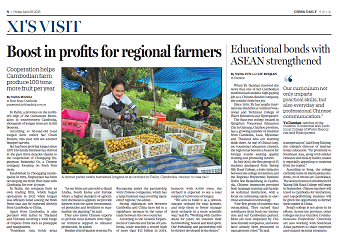Guizhou develops with goal to grow greener

Black-necked cranes roost at the Caohai Wetland in Guizhou. [Photo provided to CHINA DAILY]
Chishui is among five pilot areas where the Guizhou provincial government is promoting a transition to low-carbon development through efforts such as halting polluting projects, supporting the transformation of energy-intensive industries, encouraging the development of the digital economy and urging improvements in the environment and ecology.
Last year, the province rejected 171 projects, whose investment totaled 22.9 billion yuan, mainly because they didn't meet environmental standards set by the government.
Guizhou's curbing of pollution-emitting projects didn't affect its economic development. Last year, the province saw the industrial added value of companies whose revenue from main businesses exceeds 20 million yuan grow 12.9 percent year-on-year.
In April, five departments in Guizhou jointly released a document that specified measures to promote the digitalization of industries, including offering up to 10 million yuan in subsidies and financial awards for major companies that build digitalized production lines, workshops equipped with unmanned technologies and smart factories. Financial support is also given to small and medium-sized companies that adopt digital transformation.
For energy-intensive industries like coal mining, the provincial government has launched supportive policies, such as awarding up to 6 million yuan to designated mines that have made progress in the research and development of artificial intelligence used in mining.
All rights Reserved. 京ICP备13028878号-8







 Overview
Overview Guiyang
Guiyang Guian New Area
Guian New Area Liupanshui
Liupanshui Anshun
Anshun Qianxinan
Qianxinan Qiandongnan
Qiandongnan Qiannan
Qiannan Zunyi
Zunyi Tongren
Tongren Bijie
Bijie Guizhou commits to culture preservation and rural vitalization
Guizhou commits to culture preservation and rural vitalization Guizhou voice at 2025 national two sessions
Guizhou voice at 2025 national two sessions Meet the 'genius moms' at Shenzhen cultural fair
Meet the 'genius moms' at Shenzhen cultural fair 

